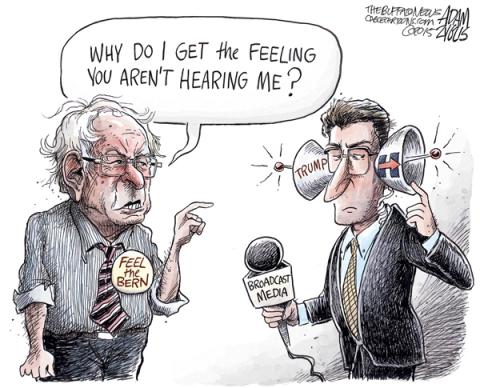- Forget Bernie Bros — the Worst Trolls Work in Corporate Media - Adam Johnson (FAIR)
- Technology is Helping Verizon Ride Out One of Its Biggest Strikes Ever - Brian Fung (Washington Post)
- What Can ISPs Do With YOUR Personal Information? The FCC Has Some Ideas … - Paul J. Feldman (CommLawBlog)
- Rush Limbaugh Is Facing A Big Pay Cut - Eric Boehlert (Meda Matters)
- Local journalism Matters More Than Ever - Vincent Duffy (RTDNA)
Forget Bernie Bros — the Worst Trolls Work in Corporate Media
By Adam Johnson
April 24, 2016
FAIR
One of the more popular pastimes of establishment media pundits is complaining of their various “trolls”—anonymous, faceless basement dwellers who lurk online and harass with aggressive, non-stop vigor. But a recent online dust-up started by Washington Post columnist Philip Bump made something clear: When you factor in actual impact, big media pundits troll just as much as—if not more than—any random egg avatar on Twitter.
Corporate media use deliberately antagonizing headlines to solicit outrage and generate traffic—only to turn around and feign indignation when they get precisely the reaction they sought.
Technology is Helping Verizon Ride Out One of Its Biggest Strikes Ever
By Brian Fung
April 18, 2016
Washington Post
Verizon's worker strike is about to enter its second week as tens of thousands of employees, outraged about the telecom giant's efforts to outsource jobs and redeploy labor from one part of the country to another, remain on the picket line. With seemingly no resolution in sight, Verizon's landline and FiOS customers who phone in seeking help are, for the moment, being routed to contractors or management employees who've been detailed to company call centers temporarily.
But a decision Verizon made at least two years ago to cut the human out of many customer interactions is blunting some of the strike's effects, company executives say. The technology-driven shift — from hold music and long wait times toward instant, digital self-service — could give Verizon a greater ability to withstand one of the biggest walk-offs in company history. And that may have implications for continuing negotiations between union leaders and management.
What Can ISPs Do With YOUR Personal Information? The FCC Has Some Ideas …
By Paul J. Feldman
April 17, 2016
CommLawBlog
Continuing its advance into the realm of privacy regulation, the FCC has proposed extensive rules that, if adopted, would impose a wide range of new regulations on Internet service providers (ISPs) in their provision of broadband Internet access service (BIAS). According to the Commission, its goal is to provide broadband consumers with “meaningful choice, greater transparency and strong security protections” with respect to personal information their ISPs collect from them. Notwithstanding those laudable aspirations, though, the proposals will almost certainly stoke considerable controversy – as will the basis asserted by the FCC for its authority to adopt the rules in the first place.
Rush Limbaugh Is Facing A Big Pay Cut
By Eric Boehlert
April 12, 2016
Media Matters
Owned by Clear Channel Communications, which has since changed its name to iHeartRadio, Premiere’s Limbaugh deal instantly dwarfed any payout in AM/FM history. (Only Howard Stern’s contract with Sirius was larger.) The contract, which included a staggering $100 million signing bonus, never panned out as the wheels began to come off Limbaugh’s radio empire.
This year, his contract is up and the timing couldn’t be worse. The talker is facing ratings hurdles, aging demographics, and an advertising community that increasingly views him as toxic, thanks in part to his days-long sexist meltdown over Sandra Fluke in 2012. (He’s also stumbling through the GOP primary season.)
Local Journalism Matters More Than Ever
By Vincent Duffy
April 20, 2016
RTDNA
While the Flint water crisis revealed a massive failure on the part of state government in Michigan, it also demonstrated the importance of local journalism, the kind of journalism local newspapers, radio and TV stations should strive to do every day.
Here was this large U-S city, existing like some third world country, and nobody knew. “If only someone reported on the Midwest”, they wrote. If only someone had been there from the beginning to follow this. If only someone paid attention to poor communities of color.
But someone did. Local journalists. Michigan Radio was there, and the Flint Journal (known online as Mlive) was there, local television stations were there, and we’ve all been covering this mess since the beginning. According to Media Matters (and I’m glad they counted because I wouldn’t have taken the time to do it) Michigan Radio and the Flint Journal combined produced more than 500 stories about the Flint water crisis between the day Flint switched water sources and the day Governor Snyder declared an emergency. While the national media may have been late to this deep well of news, local media stuck with this very complicated story from the beginning, and served our audiences in Flint by eventually getting the state to admit it and react to it. - See more at: http://rtdna.org/article/local_journalism_matters_more_than_ever#sthash…


Spread the word